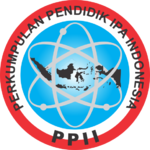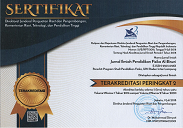Go Formative for Formative Assessment Feedback on the 10th Graders’ Material Comprehension and Learning Motivation
Abstract
Keywords
Full Text:
PDFReferences
Adella, A., Maryanti, D. S., & Rifai, R. F. (2020). Analisis Evaluasi Formatif dalam Pembelajaran IPA di Kelas 4 SDN 07 Pagi Tegal Alur. Fondatia, 4(1), 141–149. https://doi.org/10.36088/fondatia.v4i1.457
Aini, N., Ulya, H., Maulida, L., & Ainur, D. (2018). Westlive: Web-Based Assessment for Learning Using Go Formative Application for Improving Student'S Physics Concept Mastery. International Innovation, Design and Articulation i-IdeA, 1(October), 174–179. https://www.researchgate.net/publication/336834838
Amiroh, D., Kusairi, S., & Sugiyanto. (2020). Pengembangangan Sistem Penilaian Formatif Berbantuan Web (Electronic Assessment Tool) Untuk Menunjang Pembelajaran Fisika. BRILIANT: Jurnal Riset Dan Konseptual, 5(3), 488–498. http://dx.doi.org/10.28926/briliant
Ardiansyah, W., Ujihanti, M., Aryanti, N., & Meirani, W. (2018). Formative Assessment. Hollistics Journal, 10(19), 3–19. https://doi.org/10.4324/9781315166933-1
Ariyani, F., Nayana, T., Saregar, A., Yuberti, Y., & Pricilia, A. (2018). Development of Photonovela with Character Education: As an Alternative of Physics Learning Media. Jurnal Ilmiah Pendidikan Fisika Al-Biruni, 7(2), 227–237. https://doi.org/10.24042/jipfalbiruni.v7i2.3072
Ayuningtyas, D., Henry, P., & Wedi, A. (2018). Aplikasi Web Evaluasi Proses Pembelajaran dengan Pendekatan Assessmen As Learning. JKTP, 1(1), 77–84.
Baden, B., Sentot, K., & Sutarman. (2016). Pengembangan Model Penilaian Formatif Formal Berbantuan Komputer Untuk Membantu Pembelajaran Dinamika Rotasi. Jurnal Tarbiyah (Jurnal Ilmiah Kependidikan), 5(2), 7–22.
Black, P., & Wiliam, D. (1998). Assessment and classroom learning. In International Journal of Phytoremediation (Vol. 21, Issue 1). https://doi.org/10.1080/0969595980050102
Brown, G. A., Bull, J., & Pendlebury, M. (1997). Assessing Student Learning in Higher Education. Routledge.
Cruz, E., Dias, H., & Kortemeyer, G. (2011). The effect of formative assessment in Brazilian university physics courses The effect of formative assessment in Brazilian university physics courses. Revista Brasileira de Ensino de F´ısica, 33(4), 1–7. https://doi.org/10.1590/S1806-11172011000400016
Dihoff, R. E., Brosvic, G. M., & (Rider, M. L. E. (2010). The Role of Feedback During Academic Testing: The Delay Retention Effect Revisited. Department of Psychology, Rider University. www.epsteineducation.com
Ediyanto, E. (2016). Siklus Prapembelajaran Model Penilaian Formatif Web-Based Pada Pembelajaran Fisika Materi Suhu Dan Kalor Untuk Siswa Smk Kelas X. Jurnal Pendidikan Fisika Indonesia, 12(2), 126–136. https://doi.org/10.15294/jpfi.v12i2.5906
Febriyanti, C. (2013). Pengaruh Bentuk Umpan Balik dan Gaya Kognitif. Jurnal Formatif, 3(3), 203–214.
Fernando, W. (2020). Moodle quizzes and their usability for formative assessment of academic writing. Assessing Writing, 46, 100485.
Furtak, E. M., & Ruiz-primo, M. A. (2008). Making Students ’ Thinking Explicit in Writing and Discussion : An Analysis of Formative Assessment Prompts. Science Education, 92(5), 799–824. https://doi.org/10.1002/sce.20270
Granberg, C., Palm, T., & Palmberg, B. (2021). A case study of a formative assessment practice and the effects on students’ self-regulated learning. Studies in Educational Evaluation, 68, 100955.
Haryoko, S. (2011). Efektivitas strategi pemberian umpan balik terhadap kinerja praktikum mahasiswa d-3 jurusan teknik elektronika. Cakrawala Pendidikan, 1, 103–115.
Hattie, J. (2009). Visible learning: A synthesis of over 800 meta-analyses relating to achievement. In Visible Learning: A Synthesis of Over 800 Meta-Analyses Relating to Achievement. https://doi.org/10.4324/9780203887332
Hatziapostolou, T., & Paraskakis, I. (2010). An Investigation into the Impact of Formative Feedback on the Student Learning Experience. Electronic Journal of E-Learning, 8(2), 111–122.
Irons, A. (2008). Enhancing learning through formative assessment and feedback. Routledge.
Istiyono, E. (2017). The analysis of senior high school students’ physics HOTS in Bantul District measured using PhysReMChoTHOTS. AIP Conference Proceedings, 1868(August). https://doi.org/10.1063/1.4995184
Juwah, C., Macfarlane-dick, D., Matthew, B., Nicol, D., Ross, D., & Smith, B. (2004). Enhancing student learning through effective formative feedback. In The Higher Education Academy Generic Centre Enhancing (Issue 68).
Ismail, M. A. A., Ahmad, A., Mohammad, J. A. M., Fakri, N. M. R. M., Nor, M. Z. M., & Pa, M. N. M. (2019). Using Kahoot! as a formative assessment tool in medical education: a phenomenological study. BMC medical education, 19(1), 1-8.
Kalleny, N. K. (2020). Advantages of Kahoot! Game-based formative assessments along with methods of its use and application during the COVID-19 pandemic in various live learning sessions. Journal of Microscopy and Ultrastructure, 8(4), 175.
Kusairi, S. (2012). Analisis asesmen formatif fisika sma berbantuan komputer. Jurnal Penelitian Dan Evaluasi Pendidikan, 16(3), 68–87.
Leenknecht, M., Wijnia, L., Köhlen, M., Fryer, L., Rikers, R., & Loyens, S. (2021). Formative assessment as practice: The role of students’ motivation. Assessment & Evaluation in Higher Education, 46(2), 236-255.
Matlan, S. J., & Maat, S. M. (2021). Penggunaan aplikasi Quizizz sebagai alternatif penilaian formatif dalam pengajaran dan pembelajaran Matematik. Jurnal Dunia Pendidikan, 3(4), 217-227.
McCallum, S., & Milner, M. M. (2021). The effectiveness of formative assessment: student views and staff reflections. Assessment & Evaluation in Higher Education, 46(1), 1-16.
McManus, S. (2008). ATTRIBUTES OF E FFECTIVE FORMATIVE ASSESSMENT. Council of Chief State School Officer.
Mertasari, N. M. S. (2014). Membangkitkan Motivasi Belajar Matematika Melalui Variasi Model Umpan Balik dengan Mempertimbangkan Gaya Kognitif. Seminar Nasional FMIPA UNDIKSHA IV, 122–131.
Nickel, J. (2013). Formative Assessment and Syntheses in Reflection Journals. Reflection Journals, 6(3), 1–16.
Okta, H. (2018). Penerapan Tes Formatif dalam Pembelajaran Pendidikan Agama Islam di SMPN 1 Pulau Panggung Kabupaten Tanggamus. Universitas Islam Negeri Raden Intan.
Parimba, D., Azis, A., & Tawil, M. (2015). Komparasi pemberian tugas terstruktur dengan umpan balik terkoreksi dan tanpa terkoreksi pada pembelajaran fisika terhadap motivasi dan hasil belajar peserta didik kelas xi ipa sma negeri 1 rantepao. JURNAL SAINS DAN PENDIDIKAN FISIKA (JSPF), 11(1), 1–13.
Race, P. (2006). The Lecturer’s Toolkit – A Practical Guide to Assessment, Learning and Teaching (3rd Editio). Routledge.
Sahidu, H., Gunawan, G., Indriaturrahmi, I., & Astutik, F. (2017). Desain Sistem E-Assessment Pada Pembelajaran Fisika di LPTK. Jurnal Pendidikan Fisika Dan Teknologi, 3(2), 265–270. https://doi.org/10.29303/jpft.v3i2.422
Sappaile, B. I. (2014). Pengaruh Umpan Balik Hasil Tes Formatif Terhadap Hasil Belajar Matematika. JURNAL PENDIDIKAN MATEMATIKA, 5(1), 28–37.
Saptono, S., Rustaman, N. Y., Saefudin, & Widodo, A. (2013). Model Integrasi Atribut Asesmen Formatif (IAAF) Dalam Pembelajaran Biologi Sel Untuk Mengembangkan Kemampuan Penalaran dan Berpikir Analitik Mahasiswa Calon Guru. Jurnal Pendidikan IPA Indonesia, 2(1), 31–40.
Seruni, & Hikmah, N. (2014). Pemberian Umpan Balik dalam Meningkatkan Hasil Belajar dan Minat Belajar Mahasiswa. Jurnal Formatif, 4(3), 227–236.
Setyawarno, D. (2017). Peningkatan Kualitas Butir Soal dengan Analisis Aplikasi Quest. Universitas Negeri Yogyakarta.
Shute, V. J. (2008). Focus on Formative Feedback. Review of Educational Research, 78(1), 153–189. https://doi.org/10.3102/0034654307313795
Supardi. (2013). Hasil belajar matematika siswa ditinjau dari interaksi tes formatif uraian dan kecerdasan emosional. Jurnal Formatif, 3(2), 78–96. http://journal.lppmunindra.ac.id/index.php/Formatif/article/view/115/112
Sutawan, I. N., Suastra, D. I. W., & Suma, D. K. (2014). Pengaruh Pemberian Umpan Balik dalam Penilaian dan Gaya Kognitif Terhadap Hasil Belajar Fisika. E-Journal Program Pascasarjana Universitas Pendidikan Ganesha, 4.
Suyoso, S., Istiyono, E., & Subroto, S. (2017). Pengembangan Instrumen Asesmen Pengetahuan Fisika Berbasis Komputer Untuk Meningkatkan Kesiapan Peserta Didik Dalam Menghadapi Ujian Nasional Berbasis Komputer. Jurnal Pendidikan Matematika Dan Sains, 5(1), 89–97. https://doi.org/10.21831/jpms.v5i1.12461
Tanner, K., & Allen, D. (2004). Approaches to Biology Teaching and Learning : From Assays to Assessments — On Collecting Evidence in Science Teaching. The American Society for Cell Biology, 3, 69–74. https://doi.org/10.1187/cbe.04-03-0037
Tomasik, M. J., Berger, S., & Moser, U. (2018). On the development of a computer-based tool for formative student assessment: Epistemological, methodological, and practical issues. Frontiers in Psychology, 9(2245), 1–17. https://doi.org/10.3389/fpsyg.2018.02245
Wening, S. (2012). Pemanfaatan Umpan Balik Untuk Peningkatan Hasil Belajar dalam Pendidikan Kejuruan. Prosiding Seminar Nasional Pendidikan Teknik Mesin FT UNY, 350–358.
Widana, I. W. (2017). Modul Penyusunan Soal Higher Order Thinking Skill (HOTS). Jakarta: Direktorat Jenderal Pendidikan Dasar dan Menengah Departemen Pendidikan Dan Kebudayaan. Direktorat Jendral Pendidikan Dasar dan Menengah.
Xiao, Y., & Yang, M. (2019). Formative assessment and self-regulated learning: How formative assessment supports students' self-regulation in English language learning. System, 81, 39-49.
Yorke, M. (2003). Formative assessment in higher education : Moves towards theory and the enhancement of pedagogic practice. Journal of Higher Education, 45(4), 477–501.
Zainuddin, Z., Shujahat, M., Haruna, H., & Chu, S. K. W. (2020). The role of gamified e-quizzes on student learning and engagement: An interactive gamification solution for a formative assessment system. Computers & Education, 145, 103729.
DOI: http://dx.doi.org/10.24042/jipfalbiruni.v11i2.13754
Refbacks
- There are currently no refbacks.

Jurnal ilmiah pendidikan fisika Al-Biruni is licensed under a Creative Commons Attribution-ShareAlike 4.0 International License.
![]()







